Introduction
In an age where cyber threats loom larger than ever, organizations are increasingly turning to Managed Security Service Providers (MSSPs) as vital allies in fortifying their cybersecurity strategies. These specialized providers offer a comprehensive suite of services designed to enhance security postures, from threat detection and incident response to vulnerability management.
As the digital landscape evolves, understanding the nuances of MSSPs—compared to traditional Managed Service Providers (MSPs)—becomes essential for businesses seeking to navigate complex security challenges. With the integration of advanced technologies and a wealth of expertise, MSSPs not only mitigate risks but also empower organizations to focus on their core operations.
This article delves into the critical role of MSSPs, exploring their advantages, the technologies they employ, and key considerations for selecting the right partner in an increasingly interconnected world.
Defining Managed Security Service Providers (MSSPs)
Managed Security Service Providers, such as the Microsoft MSSP, act as crucial allies for entities aiming to improve their cybersecurity stance through specialized, outsourced oversight and management of protection systems. These providers, such as Microsoft MSSP, offer a comprehensive array of services, encompassing:
- Threat detection
- Incident response
- Vulnerability management
All designed to safeguard sensitive data and ensure adherence to regulatory compliance. In light of escalating cyber threats, the importance of Microsoft MSSP has become increasingly evident, as they not only enable organizations to focus on their core operations but also enhance their protective systems.
Statistics suggest that managed service providers can lower the risk of cyber attacks by up to 50%, emphasizing their vital role in a proactive defense strategy. As businesses navigate the complexities of digital threats, the expertise and advanced technologies utilized by Microsoft MSSP position them as indispensable allies in maintaining robust cybersecurity defenses. However, despite the growth of the managed security services market, several blockers impede its full potential, as noted by Pamela Winikoff.
Notably, the banking and financial sector, healthcare, and government services are forecast to represent the largest sectors in the market for Microsoft MSSP, underscoring the importance of these providers in these critical areas. Furthermore, the managed services sector demonstrates substantial growth potential from 2022 to 2032, emphasizing the significance of Microsoft MSSP in enhancing business performance.
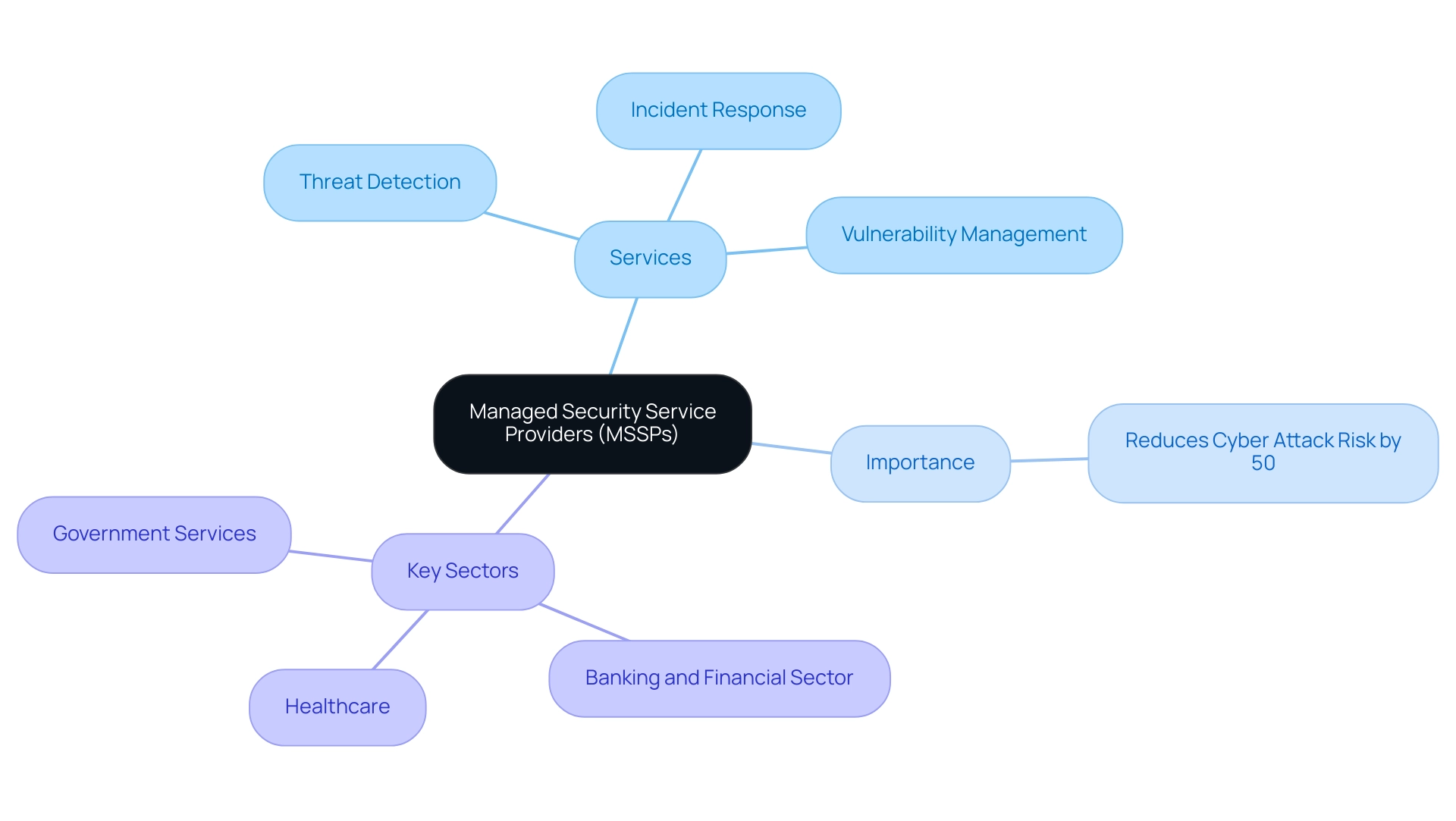
MSSPs vs. MSPs: Key Differences and Similarities
Managed Security Services Providers, such as Microsoft MSSP, and Managed Service Providers fulfill different yet complementary functions within the IT landscape. While MSPs are tasked with managing IT infrastructure and supporting end-user systems—covering functions such as network management and software updates—MSSPs hone in on security-specific services. This distinction is crucial, as Microsoft MSSP utilizes advanced technologies and specialized expertise to protect entities from evolving cyber threats.
They provide critical services including:
- Security Information and Event Management (SIEM)
- Threat intelligence
- Incident response
These services are typically beyond the scope of traditional MSP offerings. As the digital protection environment grows more intricate, comprehending these distinctions is crucial for organizations striving to enhance their defense stance effectively. With the compound annual growth rate (CAGR) for the Infrastructure as a Service (IaaS) market anticipated at 19.4 percent, the need for specialized security solutions is expected to increase, making Microsoft MSSP an invaluable resource in any enterprise's security strategy.
Moreover, industry experts have highlighted in the World Economic Forum’s 2023 Future of Jobs Report that AI and machine learning specialists, along with information protection analysts, are among the fastest-growing job roles, reflecting the critical need for expertise in this domain. This emphasizes the significance of Microsoft MSSP in providing not only services but also the skilled professionals necessary to navigate the complexities of modern cybersecurity.
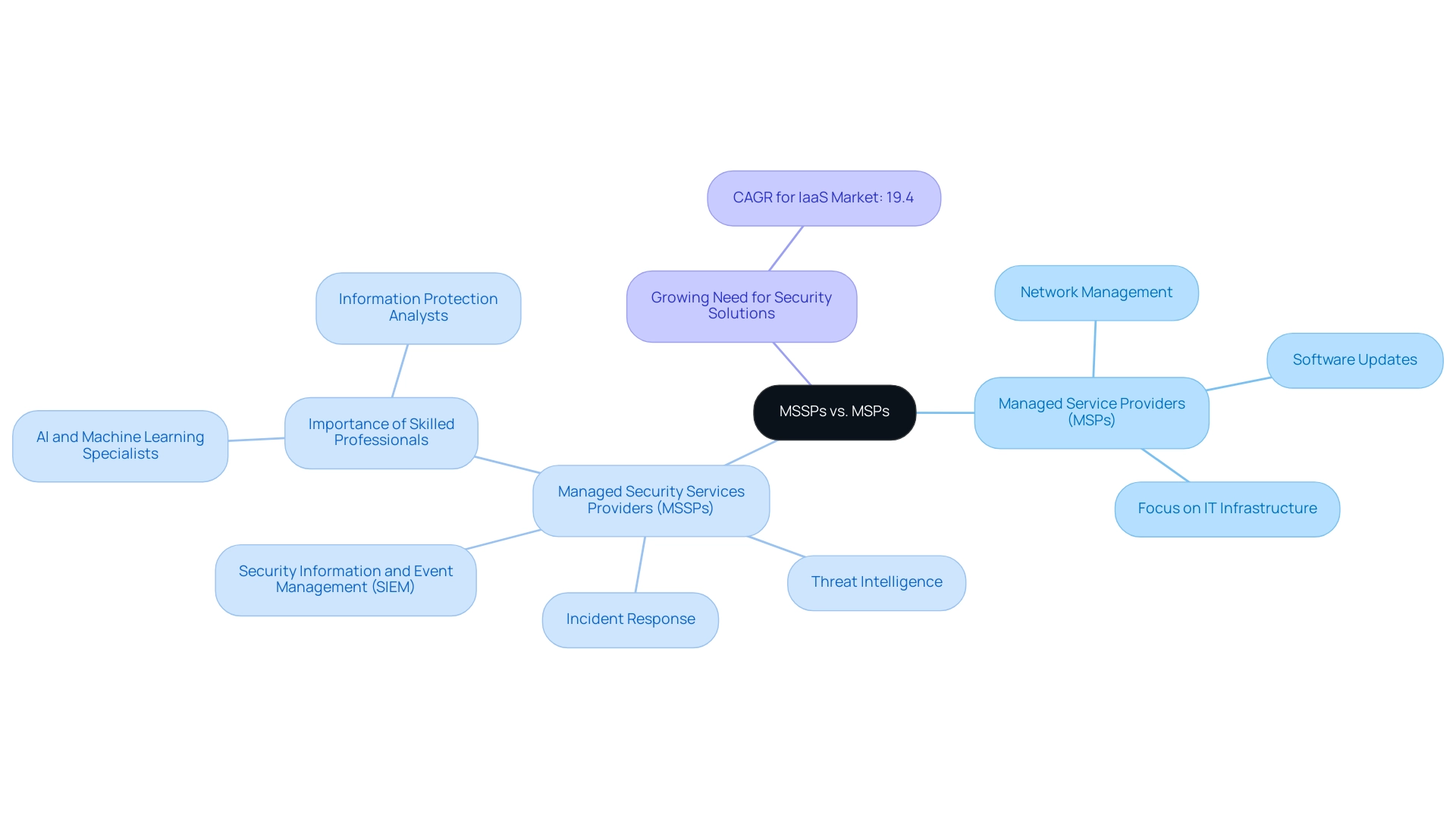
Technologies and Solutions Employed by MSSPs
Managed Service Providers, such as the Microsoft MSSP, utilize a comprehensive suite of advanced technologies to deliver effective protection services tailored to contemporary organizational needs. Central to their operations are Security Information and Event Management (SIEM) systems, which play a pivotal role in aggregating and analyzing security data from across an organization’s network. This capability allows a Microsoft MSSP to identify potential threats swiftly and accurately.
Furthermore, threat intelligence platforms enhance these efforts by offering real-time insights into emerging threats and vulnerabilities, allowing for proactive defense measures that are essential in today’s rapidly evolving threat landscape. As noted by Tajammul Pangarkar, CMO at Prudour Pvt Ltd, 'the integration of innovative technologies is crucial for staying ahead in cybersecurity.' Additional critical technologies utilized by managed security service providers include:
- Intrusion detection systems (IDS)
- Firewalls
- Endpoint protection solutions
The integration of these technologies enables Microsoft MSSP and other managed security service providers to offer robust security monitoring, incident response, and compliance management. Moreover, the Smart EV Charger Market is anticipated to reach USD 215.4 billion by 2033, reflecting the growing importance of technology in various sectors. As emphasized in the case study named 'Emerging Trends in the MSP Industry,' the MSP sector is progressing with the incorporation of IoT and blockchain technologies, suggesting an enhancement of security measures and a move towards more sophisticated technological solutions.
As the sector progresses, Microsoft MSSP are not only enhancing their security structures but also adapting to changing client expectations, ultimately ensuring that businesses are well-prepared to tackle advanced cyber threats.
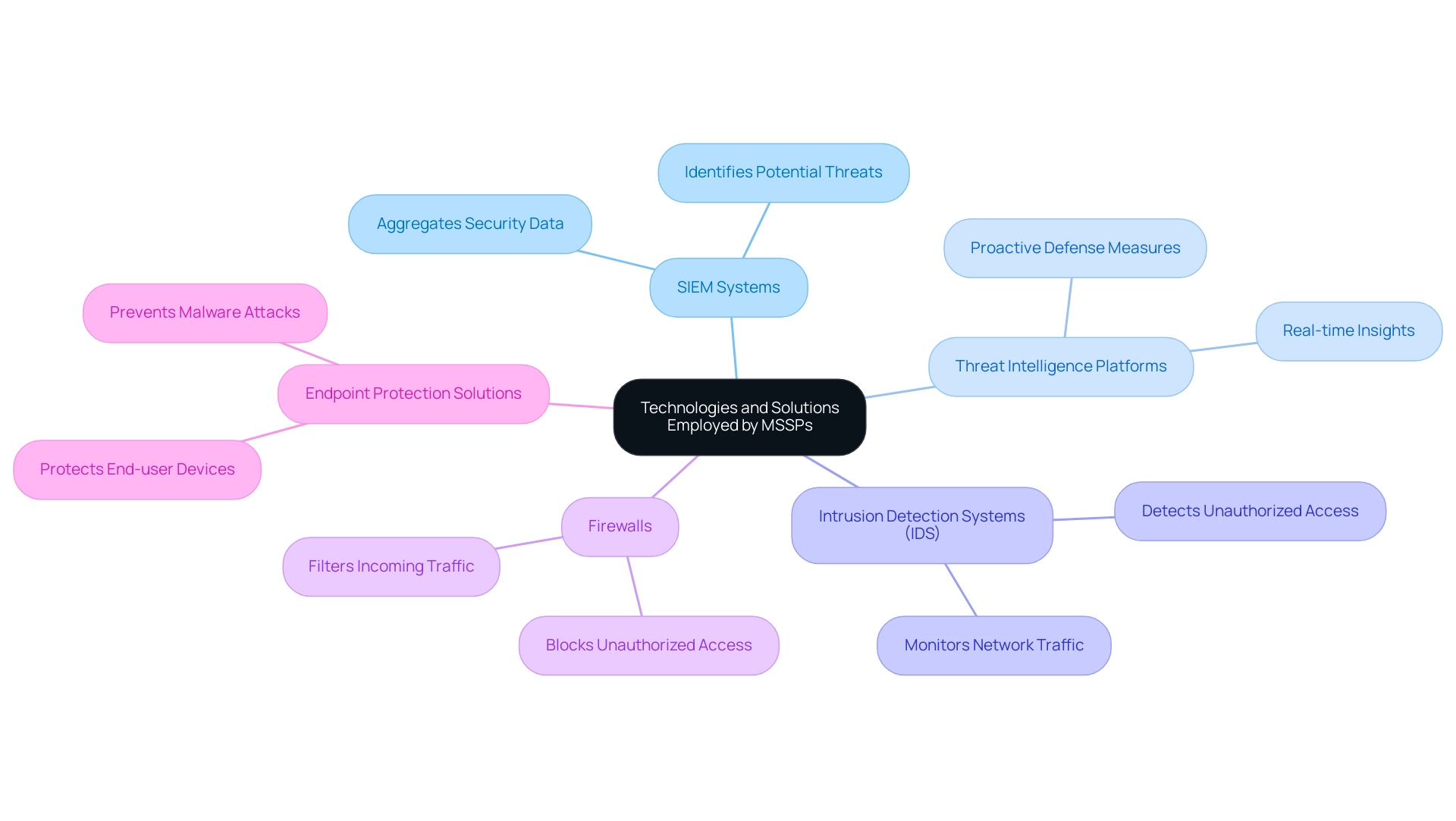
The Benefits of Partnering with an MSSP
Collaborating with a Microsoft MSSP presents a multitude of advantages for entities aiming to enhance their cybersecurity frameworks. A significant benefit is the immediate access to specialized expertise and advanced resources that may be lacking within internal teams. MSSPs provide continuous monitoring and incident response services, which are essential in reducing the time to detect and handle incidents effectively.
This ongoing oversight not only improves the organization’s threat response capabilities but also guarantees adherence to the latest protective technologies and compliance with industry regulations. Financial considerations also play a vital role; by outsourcing security functions, businesses can substantially lower overheads related to recruiting and training internal security staff. According to Grand View Research, the market is anticipated to expand at a compound annual growth rate (CAGR) of 13.6 percent from 2023 to 2030, underscoring the growing significance of Microsoft MSSP among managed security service providers in the digital security environment.
In a time when the talent pool for digital protection is increasingly strained, managed security service providers ease operational pressures that contribute to employee burnout and alert fatigue, as demonstrated in the case study titled 'Retain Valuable Cybersecurity Staff.' This case analysis emphasizes how managed security service providers assist businesses in retaining essential security experts by enabling them to concentrate on critical alerts, decreasing turnover. Ultimately, leveraging Microsoft MSSP allows companies to focus on their core business functions while confidently entrusting their cybersecurity needs to specialized providers.
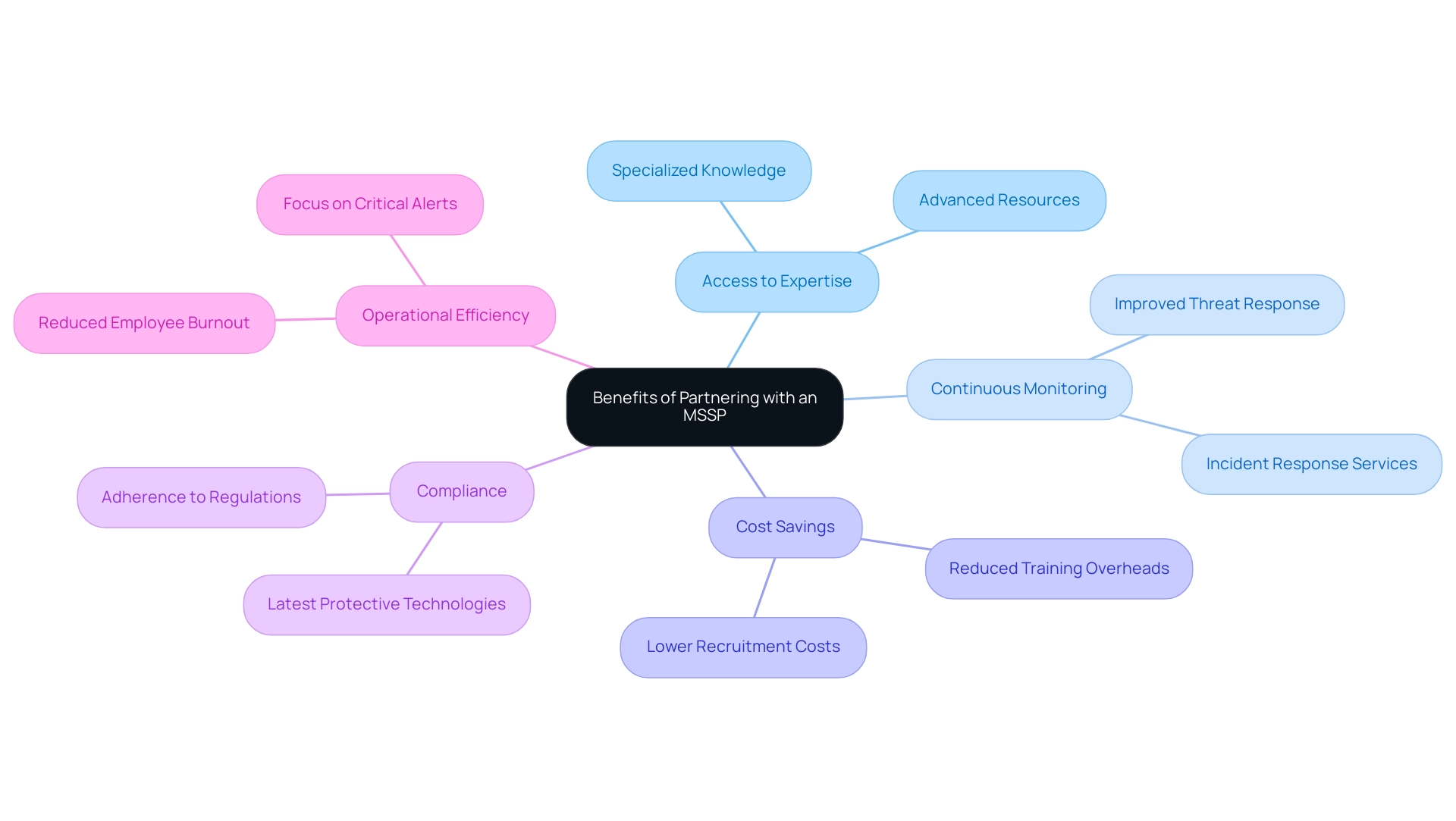
Choosing the Right MSSP: Key Considerations
Choosing the appropriate Microsoft MSSP as a Managed Security Service Provider is a crucial decision for businesses, especially considering the increased risks encountered by middle market firms in today’s cyber environment. Key considerations include:
- Assessing the Microsoft MSSP's expertise and experience within your specific industry, as this knowledge is essential for effectively addressing unique protection challenges.
- Assessing the breadth of services offered, such as:
- Incident response
- Threat detection
- Compliance management
A thorough review of the MSSP's technology stack and methodologies is essential to ascertain their use of contemporary tools and best practices.
Additionally, reputation plays a significant role—client references and testimonials can offer valuable insights into the MSSP's reliability and effectiveness. As one satisfied client noted, "I was really impressed with the way STS Consulting Group handled everything. From the first conversation to everything in between, they were very helpful and knowledgeable."
Such feedback underscores the importance of a dedicated approach in the security sector. Another client echoed this sentiment, stating, "STS Consulting Group was the missing piece to my puzzle. From start to finish, they solved every problem and helped us achieve our goals in the most professional way possible."
Organizations are advised to thoroughly question potential managed security service providers, including Microsoft MSSP, about their services and commitment to industry standards; a strong partnership hinges on ongoing collaboration and transparent communication.
Case studies, such as the one illustrating the pitfalls of one-size-fits-all cybersecurity solutions, emphasize the necessity for Microsoft MSSPs to customize their offerings to meet the specific needs of their clients. For instance, the case study titled 'Custom Solutions in Cybersecurity' highlights how top providers create tailored solutions by evaluating customer needs and selecting appropriate technologies.
Furthermore, referencing insights from publications like The Real Economy and the RSM US Middle Market Business Index can provide additional context and credibility about the importance of industry-specific knowledge. By focusing on these critical factors, including the breadth of services and proven case studies, organizations can ensure they choose an MSSP that not only meets their current security needs but also aligns with their future vision.
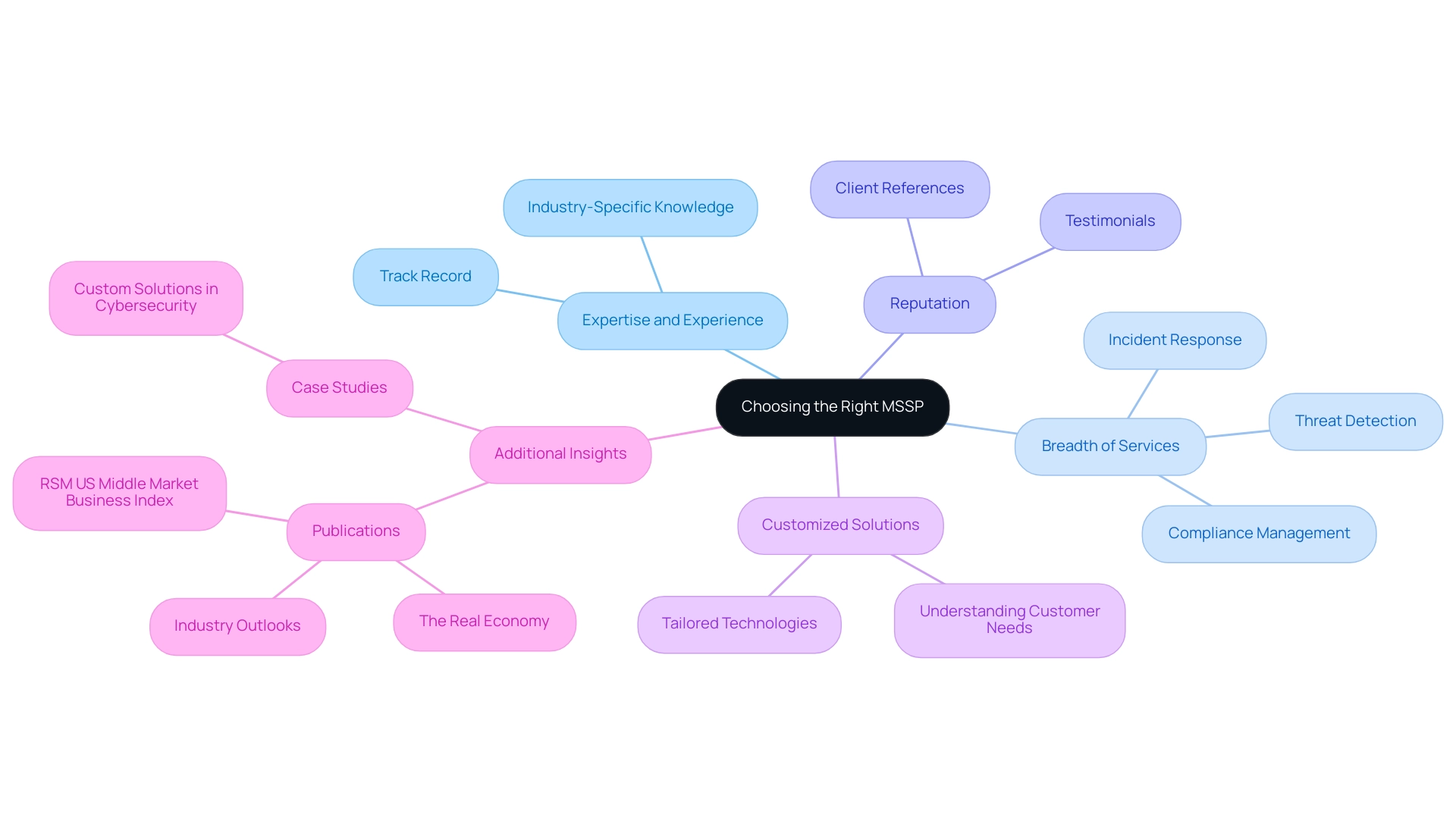
Conclusion
The increasing complexity of cyber threats necessitates a proactive approach to cybersecurity, making Managed Security Service Providers (MSSPs) an essential partner for organizations. By offering specialized services such as:
- Threat detection
- Incident response
- Vulnerability management
MSSPs empower businesses to bolster their security postures while allowing them to focus on core operations. The distinction between MSSPs and traditional Managed Service Providers (MSPs) is crucial, as MSSPs provide the advanced expertise and technologies required to navigate the ever-evolving threat landscape.
Organizations that choose to partner with MSSPs gain immediate access to round-the-clock monitoring and the latest security technologies, significantly enhancing their ability to respond to incidents swiftly. Financially, outsourcing security functions to MSSPs can lead to substantial cost savings, alleviating the burden of recruiting and training internal cybersecurity personnel. This partnership not only mitigates operational risks but also helps retain valuable cybersecurity staff by reducing alert fatigue and burnout.
Selecting the right MSSP is a critical decision that can profoundly influence an organization's security framework. Key considerations include:
- The MSSP's industry expertise
- Service breadth
- Technological capabilities
- Reputation
By prioritizing these factors, organizations can forge a partnership that not only addresses their current security challenges but also positions them for success in the face of future threats. In a world where cybersecurity is paramount, aligning with a capable MSSP could very well be the linchpin of a robust cybersecurity strategy.




